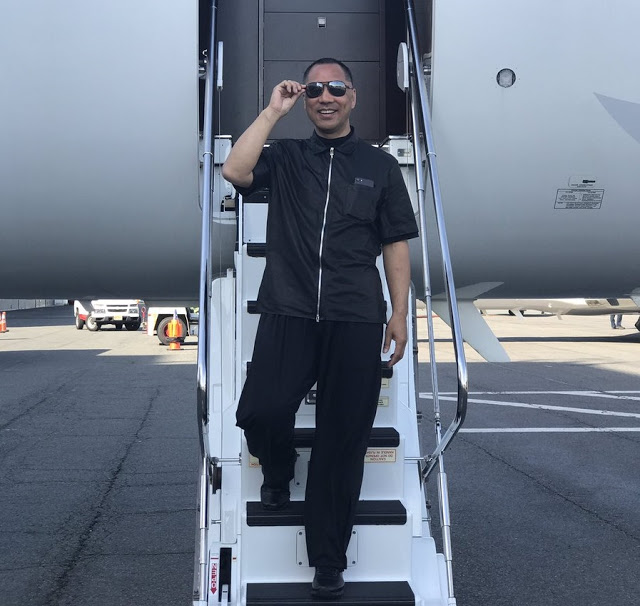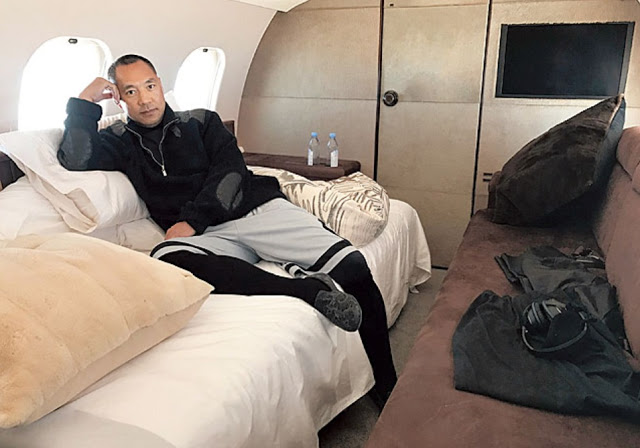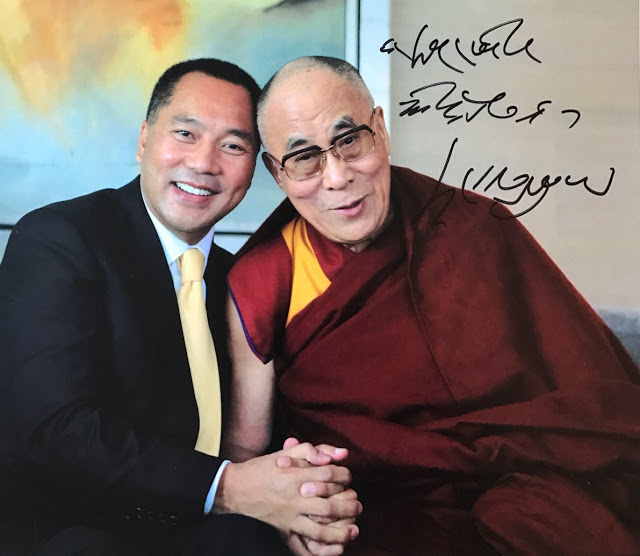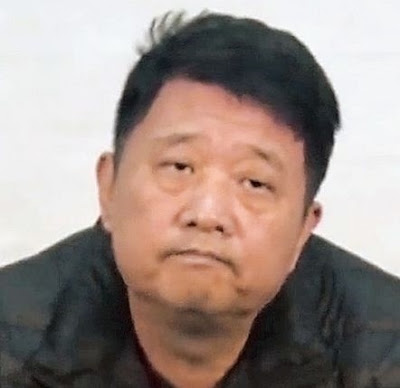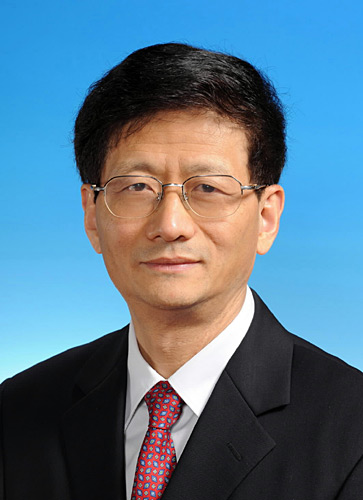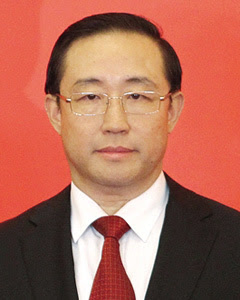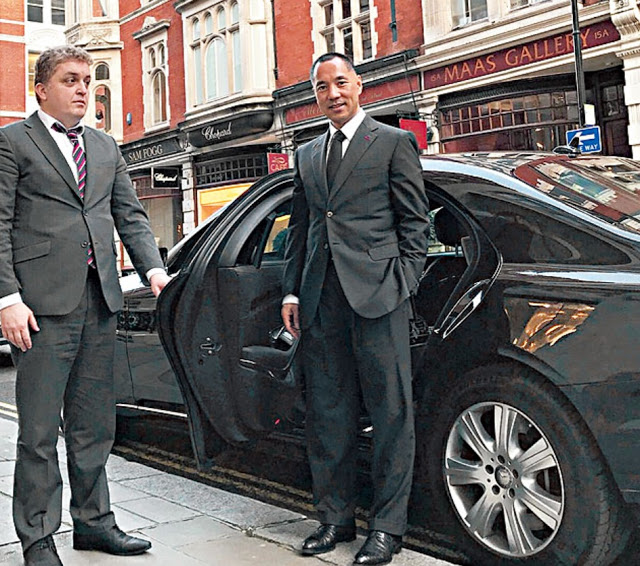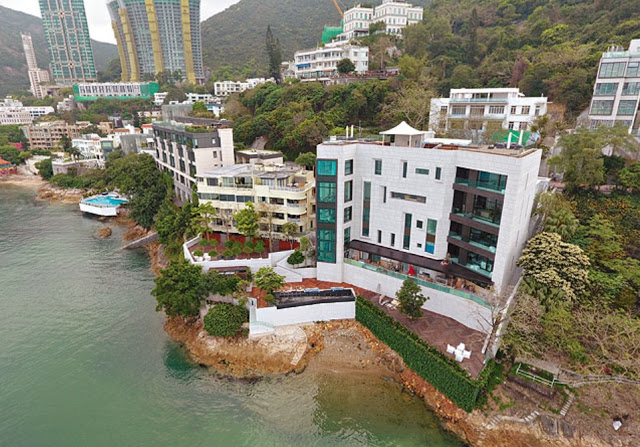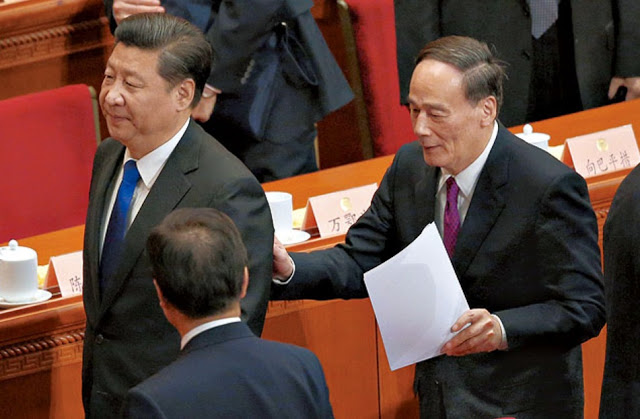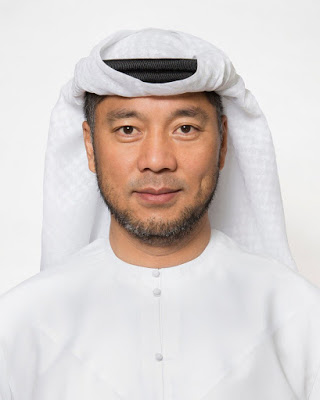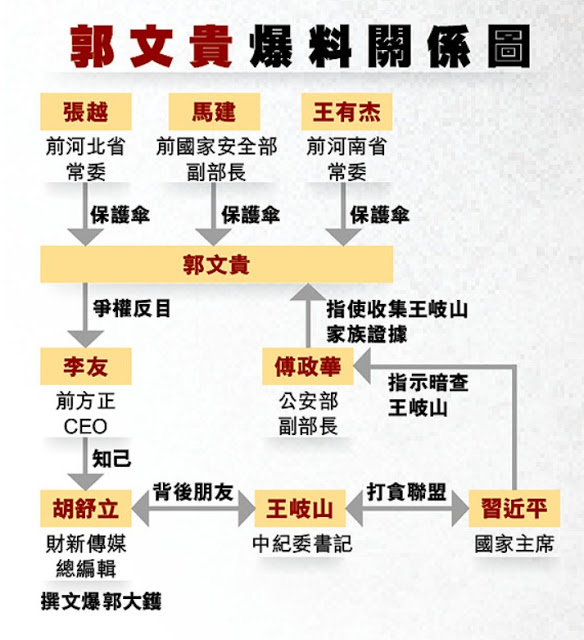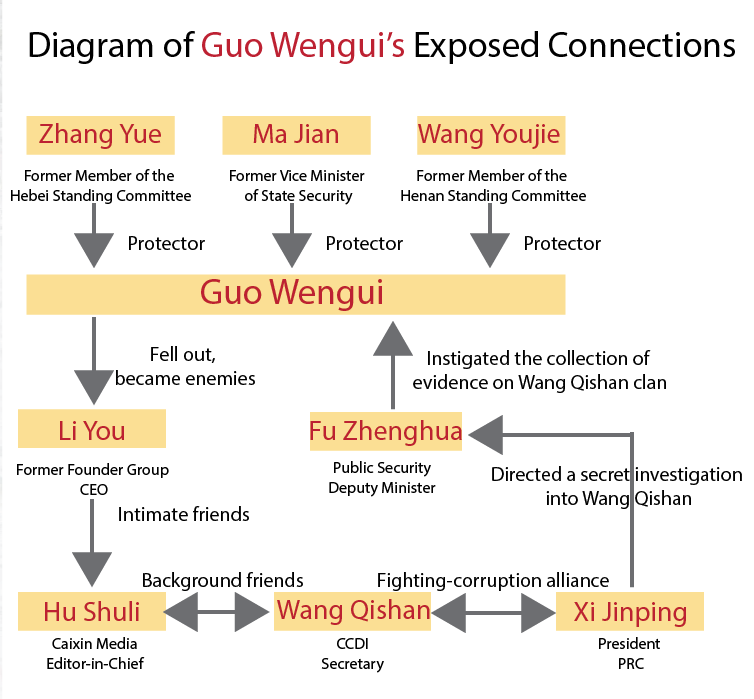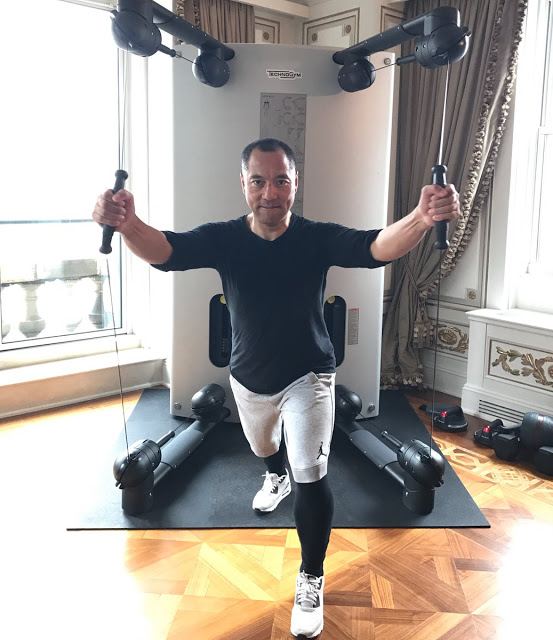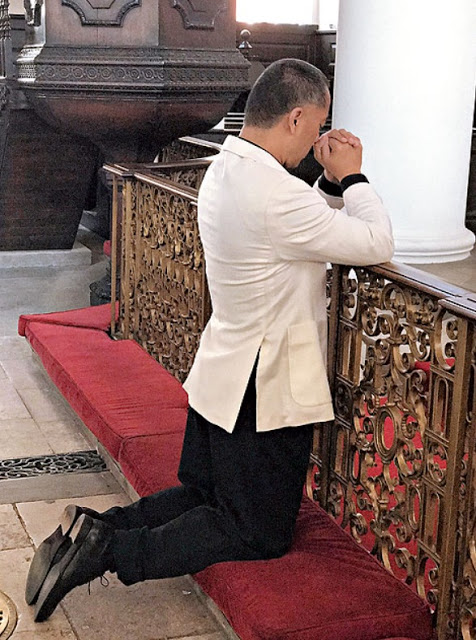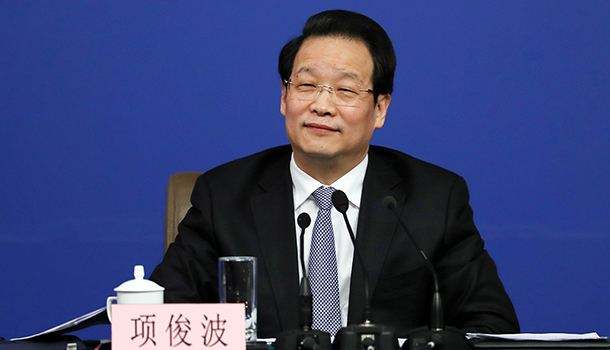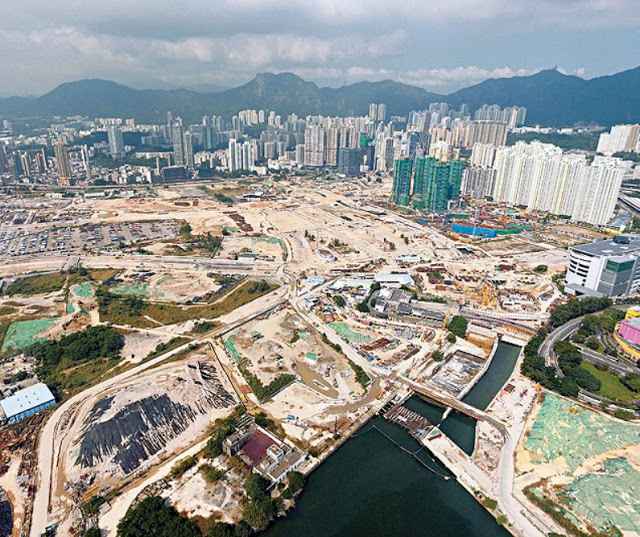Chinese billionaire Guo Wengui, who has suspected ties to China’s intelligence apparatus and is currently living in New York, began releasing allegations of corruption and division among top levels of the CCP in March. Beijing responded with counteraccusations of corruption, by lobbying Interpol to issue a “red notice” for his arrest, and by threatening “serious consequences” for unapproved online news or commentary related to Guo. Guo has not yet released the evidence he claims will corroborate his allegations, instead wishing to “let the bullets fly for a while” before holding a “global news conference.” Meanwhile, the tycoon has been posting personal video updates and tweets peppered with further allegations and images from his lavish lifestyle, and has been building a substantial following among Chinese social media users both in- and outside of the Great Firewall.
While the English media has been largely silent on Guo in recent weeks, a few commentaries made it into the current news cycle. At the South China Morning Post, Wang Xiangwei situates the publicity battle between Guo and Zhongnanhai about corruption into the modern history of Chinese official-“robber baron” collusion. At China Policy Institute: Analysis, Graham Bond uses Guo’s case to illustrate the risks of the CCP’s media control strategy, which suppresses independent reporting and has allowed rumor to be widely mistaken for news. It remains to be seen which category Guo’s claims fall under.
Pending further details on Guo’s case from the English news media, CDT has translated a recent Hong Kong news story on Guo. This interview and backgrounder was originally published on May 8 by Hong Kong’s Next Weekly (壹周刊), and has been translated in full by CDT:
Hong Kong Next Weekly: Exclusive Interview with Guo Wengui
Guo Wengui is a legend. He is also an exceedingly difficult person. Only Guo Wengui is able to cause a headache for the entire CCP Politburo Standing Committee; prompt Interpol to issue a “Red Arrest Notice”; and furthermore impel the Foreign Ministry to pressure U.S. congress, cut off his exposé program on Voice of America, and turn all of the state’s power on him alone.

Guo Wengui is sitting on billions in financial assets. After being forced into exile in the U.S., he’s become wanted by Interpol for detonating an inside story on high-level CCP politics, which has since turned him into an international news figure. Voice of America’s previous interruption of his live interview resulted in an uproar and the suspension of several interviewers.
He once claimed that his family fund controls 28 billion USD and 120 billion RMB in assets. Moreover he enjoys a lavish life: luxury cars, private aircraft, countless grand mansions. He has single-handedly fought with the CCP, claiming that he wants to “save his life, save his money, and gain revenge.”
After his Voice of America program was cut short, he disappeared from the media. When this publication found him, he suddenly divulged content of interest to the Hong Kong people.
Guo Wengui came from a humble background and has a low education level. Relying on his silver tongue, he has traversed the state-business world. According to Chinese government statements, he bribed the assistant director of the Ministry of State Security. Even Hebei and Henan provincial Party committees must listen to his words. Relying on the force and support of these three departments, he has run amuck and stirred up trouble. After this came to light, he took his secrets to the U.S., exiled from China overseas where corrupt officials and economic criminals are everywhere. Unfortunately, his exile was very high-profile, and he was unafraid of being silenced for his explosive CCP inside story.
He has recently broken two shocking world news stories, one being that Chairman Xi Jinping actually doesn’t trust CCDI secretary Wang Qishan, and there’s a secret clique within Zhongnanhai. Ministry of Public Security assistant chief Fu Zhenghua was reportedly sent to investigate Wang Qishan’s family and Central Political and Legal Affairs Commission secretary Meng Jianzhu.
The second one was about the secret connections of Hainan Airlines Group. On the program, Guo Wengui indicated that Wang Qishan’s wife Yao Mingshan and her nephew Yao Qing hold shares in Hainan Airlines. Wang Qishan’s father-in-law is CCP elder Yao Yilin, once the Vice-Premier of the State Council.
Halfway through the program, it is said that the Foreign Ministry strongly requested the broadcast be terminated, plus the ministry confirmed that Interpol had issued a red notice for him. Guo Wengui had become a globally wanted criminal, even as he rose to fame. China will soon hold the 19th Party Congress, the CCP’s authority is fierce, and everyone is fixed on Guo Wengui to see whether or not he will continue with his scoops.
This publication exclusively found Guo Wengui. He claimed that he had high-level connections with the mainland Ministries of State Security and Public Security, and also that he had a bombshell about the Ministry of Public Security and the Domestic Security Department frequently crossing the border to enforce the law in Hong Kong, including searching the homes of people like Xiao Jianhua and Li Bo before their “voluntary” northbound trips to the mainland. Guo Wengui has scoffed that these things have already happened countless times before, and that it’s just the Hong Kong people making a fuss.

Guo Wengui rides a private plane to and from the UK, US, and other countries, publishing selfies online to flaunt his wealth.
Furthermore he continues to drop bombs about Chinese enterprises raising prices in Hong Kong. The actual situation is a “infiltration and dilution plan,” using mainlanders to dilute the Hong Kong population and hoping even more that Chinese capital can control Hong Kong’s economic livelihood. Guo Wengui said: “Control the real estate market, and you will control the life or death of Hong Kong.”
This ultra-rich man who speaks with a heavy northeastern accent also jeers at Hong Kong’s rich second and third generationers for fawning over Beijing officials, seeking their shelter, which in his opinion is simply “too pathetic, too selfish, and inconsiderate of the overall interests of the Hong Kong people.”
One after another, these unsurprising bombs haven’t stopped. This publication has asked him to provide proof backing up his statements, and he said of course he has it, and that after a while he will personally show it to the world. And so on.
Believe him or not, but due to his long term close relationship with the Ministry of State Security and the CCP’s allergic reaction to him, we all want to hear what he has to say.
According to Guo Wengui, he holds 11 passports, including ones from the US and UK, and he’s said on Twitter that he also has the right of abode in Abu Dhabi! According to him, he even has a Hong Kong identity card, and he’s told others that he’s changed his name to Guo Haoyun. In 2011, via the BVI company, he purchased grand mansions #20 and #22 on South Bay Road, and there have been reports that his son Guo Qiang has been seen in and out of the residence.
It was revealed last year that his residence constitutes an unauthorized construction project. This publication last Saturday discovered that construction on his residence was still underway. The reporter inquired to the workers and to state security whether his family was present, but security personnel prevented journalists from interviewing and filming.

Photo of Guo Wengui with the Dalai Lama.
Online Guo Wengui has continued to publish his own recent developments, including his comings and goings on expensive racing bikes, his daily runs, etc., seeming to be completely indifferent to the CCP suppression. Via WhatsApp, this publication got in touch with Guo Wengui, his portrait showed himself posing for a photo with the Dalai Lama.
This publication requested a video interview, but in the end he only consented to a telephone recording. We asked him what he was holding as far as substantive material, and keeping us in suspense he said: “At a certain time, I will talk about the Hong Kong affair loudly, not in a whisper. Just like with mainland affairs, if I am to speak about it I will do so Ioudly.” This suggested that at any time he could let loose more material.
Guo Wengui broke the news that Meng Jianzhu and Fu Zhenghua controlled several thousand Public Security and State Security officials in Hong Kong operations. Guo is aware of this news perhaps because former State Security assistant chief Ma Jian was his secret friend, but now he has been sacked due to the investigation.

Former Ministry of State Security Vice-director Ma Jian

Central Political and Legal Affairs Commission secretary Meng Jianzhu

Ministry of Public Security Vice-director Fu Zhenghua
News Item 1: State and Public Security Have Long Handled Cases in Hong Kong
Next Magazine: You say that Public Security and State Security have been enforcing the law across the border in Hong Kong. What are the specifics?
Guo: Hong Kong compatriots are really too honest. Hong Kong currently has so many mainland state security and public security agents here handling cases and investigating long term. I know that at the very minimum they are inside the China Resources building, at Causeway Bay, and also in the Fo Tan (where they have a permanent office). I know at the very minimum there are more than 300 enforcing the law in Hong Kong. They often go on house searches, knocking on doors, go to banks to check on capital, shadow suspects, they are already in Hong Kong enforcing the law.
Hehe, outside media says that Ma Jian (former Ministry of State Security vice director), in his two suites in Hong Kong’s Tai Koo Shing, the ones he said that I gave him, those two, that people broke in and searched many times. You think for a sec, were those doors opened by Hong Kong police? Certainly not, so who? Definitely they were from the mainland, officers from the mainland knocking at the door to search.
Before I’d arrived in the U.S., I came over to Hong Kong, I’d often meet these people, some from Beijing Public Security Bureau, some from state security, including general staff from the two intelligence bureaus. At the very least there are several thousand operating in Hong Kong.
Next: How do you see Xiao Jianhua “being carried away” from the Hong Kong Four Seasons Resort and returned to the mainland, and the Causeway Bay Bookstore incident?
Guo: Several years prior people had already been caught in Hong Kong and returned, this much is clear! Because people from the Ministry of State Security are in Hong Kong, many of whom I know, they do it so much, kidnapping and returning people, it’s just that Xiao Jianhua was well-known. I wasn’t at all surprised about the Causeway Bay incident! The Causeway Bay incident is a plot, part of an upper-level political struggle, basically completely different than the rule of law of Hong Kong.
Think about it, Xiao Jianhua’s office was searched and his computers taken away, who would do this? All of them were mainland police who came to Hong Kong, the Hong Kong police were not concerned! Hong Kong people still fill the streets in demonstration, saying: “Oppose Cross-border Law Enforcement in Hong Kong.” Early on they were in your home bedroom enforcing the law, what I feel sorrowful for is that the Hong Kong police all know about this affair, and that they have a firm handle on various evidence against Beijing that Hong Kong government officials have obtained. This is what is scary, this is what is really scary.

To protect his safety wherever he goes, Guo Wengui bought a bulletproof Benz.

Guo has many brand name luxury cars, worth more than 10 million HKD.

In 2011 Guo Wengui purchased an 800 million dollar South Beach mansion. That project is still underway.
News Item 2: Chinese Capital and the “Infiltrating and Dilution” Plan
Next: Nearly a year ago, Chinese enterprise Hainan Airlines scrambled into the Hong Kong high-price rush, last year acquiring land from Qide at an astronomical price. The market is in an uproar.
Guo: Land purchases in Hong Kong are not for development, it is known as “Infiltrating and Diluting.” First, send tons of immigrants over and then exchange the area so that there are no more locals but lots of mainlanders.
Number two is economic infiltration and dilution. All real estate big shots and clans, you will not have the opportunity to develop. Only mainlanders control the entire real estate market. Control the real estate market, and you control Hong Kong’s livelihood, they can let you fall, let the real estate market fall 50%. Hong Kongers will be jumping off buildings and into the sea. They can also let you rise, real estate is a political plot.
The money used by Hainan Airlines in the land purchases, in the future half will be borrowed from Hong Kong banks, who cannot pay back the money, it isn’t hijacked by mainland banks. In the end Hong Kong finance is hijacked and the ordinary people don’t dare to struggle.
Great disaster on the economy, political system, and international reputation is possibly in Hong Kong’s future. An immense incident could occur.
Next: What connections are there between Hainan Airlines and Wang Qishan?
Guo: They had Wang Qishan’s support, Wang Qishan is a shareholder, who else could bring a few hundred million from China? How could that be? Of course it’s not normal, of course the shareholders are Wang Qishan’s clan (Hainan Airlines), he’s their boss.
Before could you believe that Secretary Wang Qishan and his clan could act like this? Nobody would believe it, Hong Kong is all under Meng Jianzhu’s complete control, anything he wants to do he can do.
(This publication asked Guo Wengui for proof of a connection between Hainan Airlines and Wang Qishan, and he failed to supply any definitive evidence.)

In March at the NPC meetings Xi Jinping and Wang Qishan talked and smiled, not knowing that Guo Wengui was about to expose the investigation into Wang Qishan.
News Item 3: Hong Kong’s Rich and Powerful Curry Favor With Beijing Officials, Pitiful!
Next: Do you know any Hong Kong business tycoons?
Guo: I know a ton. Hong Kong tycoons all go to Beijing to curry favor with officials, to beg for shelter. But don’t forget, they’re all nothing but a bunch of tools.
Hong Kong rich second and third generations all act so over-the-top toward everyday people. They’re always so arrogant. But as soon as they see a Mainland official, they kneel down on the ground like they’re nothing. Now you tell me–how pitiful is that kind of life, without dignity?
I know a ton of Hong Kong tycoons. They used to be so respected by people. Now, it’s everyone for himself, bowing their heads. How pitiful!
[Note] (This publication asked for the names of these tycoons multiple times. Guo Wengui did not respond. Many Hong Kongers with dim views of the future believe that the “One Country Two Systems” ideal is an unrealizable one. They believe Hong Kong will slowly become a regular mainland provincial-level municipality. Over the past few years, many Hong Kongers have talked about emigrating out of Hong Kong. Guo Wengui emigrated to a foreign country long ago, yet, ironically, he still criticizes Hong Kongers.)
Guo: You want to emigrate, where can you go? Your own home has been stolen away from you, and you want to run away. You don’t protect your home. Instead, you run away. There are some problems with the way Hong Kongers think. The littlest thing and they immediately want to emigrate. That’s called running away, not emigrating.

It has been pointed out that Guo Wengui has given up his Chinese citizenship and retains the right to residency in Abu Dhabi.
Because his secret police “buddy,” former Vice Minister of State Security Ma Jian, was investigated and subsequently sacked corruption, in 2015 Guo left China to live in exile in the United States. He maintained his lavish lifestyle during that time, frequently “showing off” in posts on Twitter and elsewhere on the internet. He continuously posted pictures of his mansions in the U.S. and U.K. Guo Wengui claims to own 29 luxury vehicles, including a McLaren P1, LaFerrari, Koenigsegg CCX, Apollo, etc. Each of these costs over 10 million. His lavish lifestyle is staggering. For his personal safety, Mercedes Benz made him a custom-made bulletproof car.

Diagram of Guo Wengui’s exposed connections.
On Twitter, he claimed to have three residences in Manhattan. One of them he bought for $80 million. The luxurious residence has even been equipped with a fitness room. He claims to exercise six times a week, for two hours at a time. He posts a picture each time he works out, always dripping with sweat.
Guo Wengui is only 50 years old. According to 2014 Hurun Report China Rich List, he ranked 76th with 15.5 billion renminbi. But he has previously claimed in interviews that his family controls more than 300 billion HKD in assets.

At 50, Guo Wengui is still very fit. He works out regularly, as if to keep projecting his tenacity, like he’s liable to continue divulging more revelations at any moment.
Guo Wengui’s ancestors are from Shandong Province. He lived with his parents in Jilin since childhood. His Mandarin exhibits a heavy Northeastern accent. He left home to work after graduating from middle school, and at 17 he married 16-year-old girl named Yue Qingzhi. They had one son and one daughter. His son, Guo Qiang, and daughter, Guo Mei, both help out their father with business. Guo Mei studied film in the U.S. and once served as an assistant director on a Zhang Yimou film.
He hails from a grassroots, rural area, and his education level is low. Yet, amazingly, he was able to transform himself into a member of the world-class super-rich. All kinds of media have reported on him in all kinds of ways. According to the analysis of pundit Xiao Ruoyuan on his website, Guo’s money-making methods are very clever.
This publication asked Xiao Ruoyuan if he knows Guo. Xiao indicated that he was mostly basing his analysis on other reporting. He was amazed that Guo was able to secure a loan from Agricultural Bank in the hundreds of millions in 2010 to develop the “Pangu Plaza” real estate project in Beijing.
According to Xiao, “Guo Wengui didn’t even have 10 million in his account at the time, and he had tons of people chasing after him to pay [for work on the plaza].” Securing 3.2 billion from the bank is no small matter. The bank has a lot of precautions and regulations.
So Guo Wengui had to prepare a lot of documents. “The first thing he needed was to prepare a financial report for Agricultural Bank showing that he would be taking in revenue for three straight years. Then he needed a fake tax certificate saying that the tax bureau verified he actually paid taxes and that they had estimated the value of the project.”
In the end, Agricultural Bank lent him 3.2 billion yuan. But at that time, they weren’t going to give the money directly to Guo Wengui himself. Rather, they gave it to the construction company. “They weren’t going to give the loan to Guo Wengui to do the construction work. They would give the loan to the construction company as payment for the project. So Guo Wengui found a construction company (Cheng Jian Wu). It was a state owned construction company. They made a fake contract for renovation work. The commissioner produced fake documents falsely reporting the project’s progress.”
The report was false, but Guo Wengui still needed documentation proving that the construction company had “commenced work.” “The documentation needed to be issued by central authorities. In the beginning, they couldn’t get the documentation needed for 3.5 billion, because the tax involved was too high. In the end, they actually had to make a fake one of those, too.”
Guo Wengui accuses public and state security organizations of coming to Hong Kong over a long period of time to conduct law enforcement activities on all types of cases. Last year, this publication filmed a large group of suspected public security officials entering Hong Kong to protect Zhang Dejiang during a visit.
Turning Into An Enemy
Mainland reporting claims that Guo used 1.6 billion of the 3.2 billion yuan loan to purchase stock in Minzu Securities, and he transferred over 600 million yuan through underground banks into Hong Kong. With this money, he purchased his South Bay mansion. Later, the National Audit Office became suspicious of his loan, and Guo then repaid the loan early. The matter was dropped.
Later, Guo Wengui’s Minzu Securities merged with Founder Group. Founder’s CEO was a man named Li You. The relationship between the two was once very close. They flew on private jets to vacation together all over the world. The two later became enemies after they both competed for the directorship of the company. After their falling out, they both went public with information they had on one another. It was revealed that Guo had connections with the Ministry of State Security and high-level officials in the provincial governments of Hebei and Henan. In turn, Guo exposed Li’s relationships with Caixin Magazine Chief Editor Hu Shuli, along with the relationship between Wang Qishan and others behind Hu.
In January 2015, Li You was detained and investigated for insider trading. Two months after he was detained, Caixin published an article titled “Power Hunter Guo Wengui,” exposing how he leveraged the power of top-level officials to accumulate wealth. Guo Wengui in turn exposed the very close relationship between Caixin Chief Editor Hu Shuli and Li You, and pointed out that Caixin belonged to Wang Qishan’s faction.
In early April, CIRC Chairman Xiang Junbo was investigated on suspicion of serious violations of discipline. The investigation revealed that Xiang Junbo once served as the Chairman of Agricultural Bank. There were rumors that he approved the loan that year to Guo Wengui. Because of this, he was removed from office and investigated.
The revelations had wide-ranging implications — from countless business people on the bottom to top officials from various national-level ministries and commissions, even members of the CPC Politburo Standing Committee. The whole matter became extremely complicated and highly sensitive. As Guo spent much time among top CPC officials, the mountains at his back were being gradually detained. This caused the whole world to be even more interested in his revelations. People hoped he would reveal even “fiercer” information.

Guo Wengui practices a diverse range of religious beliefs, sometimes worshipping the Buddha, other times praying at church.
Guo has claimed his revelations are in order to “save his life, save his money, and gain revenge.” He said Deputy Minister of Public Security Fu Zhenghua had threatened the safety of his family and employees for investigating evidence of corruption involving Wang Qishan and Meng Jianzhu. Because he wasn’t able to turn up enough evidence to satisfy them, and his enemies were closing in, Guo explained, he fought back by revealing information–realizing his goal of protecting the safety of himself and his family by increasing visibility.
According to reports, Guo Wengui’s “protective umbrella” consists of former Vice Minister of State Security Ma Jian, Hebei Provincial Committee member and Secretary of the Political and Legal Committee Zhang Yue, and Henan Provincial Standing Committee member Wang Youjie. According to official CCP information, Ma Jian was deposed through anti-corruption efforts in 2015. He testified on video that he came to know Guo Wengui in 2008. Guo knew that he could protect his business empire by developing a closer relationship with Ma Jian.

Former CIRC Chairman Xiang Junbo once served as Chairman of Agricultural Bank, which loaned 3.2 billion yuan to Guo Wengui. He was investigated on suspicion of serious violations of discipline in early April of this year.
In video testimony given after his arrest, Ma Jian personally admitted: “From 2008 to 2014, I used the power and facilities afforded me through my position to provide Guo Wengui with a lot of help with personal issues and with operating his business.”
For example, in 2011 when Guo Wengui ran into problems with his development project “Pangu Plaza” due to issues with the land and personal disputes, he went to Ma Jian for help. Even when he wanted to purchase Minzu Securities, he immediately asked for the help of Ma Jian. Ma Jian put pressure on the Civil Aviation Authority by showing the relationship between Guo Wengui and the Ministry of State Security. Ultimately, the Civil Aviation Authority agreed to their requests.
But most egregiously, he used his “protective umbrella” spy network to eliminate his rivals. Former Executive Director of Zhengquan Real Estate, Qu Long, was once a Guo Wengui crony. Later, because of business disputes, Qu Long reported Guo’s name to authorities. Guo Wengui then enlisted the help of Ma Jian and Zhang Yue who used their positions to get rid of Qu Long. Then they contacted the Hebei Provincial Public Security Bureau, which ultimately led to the Hebei Chengde Court convicting Qu Long of illegal possession of a firearm and sentencing him to 15 years in prison. According to reports, Qu Long has been moved to Beijing to help the authorities with their investigation of Guo Wengui.

Chinese investment money has been vigorously buying land in Hong Kong, including paying exorbitant prices for lots of land in Kai Tak. Guo Wengui calls this part of the “infiltration” plan, to price Hong Kongers out.
Over a period of time before and after this was going on, Ma Jian received 60 million yuan in bribes. He admitted, “In the period of time around 2011, Guo Wengui bought me two properties in Hong Kong’s Tai Koo Shing. The total area was 200 square meters. (about 2,000 square feet). Altogether, he spent over 30 million HKD. To avoid some risk, the property was purchased under the name of my nephew. But in actuality, I was the real owner.”
He gave another example: “I went to Hong Kong to shop at a flea market, and bought some old clocks and flower racks and whatnot. I spent over 90 thousand HKD. As I was getting ready to leave Hong Kong, Guo Wengui’s assistant hurried over to send me out and put 100 thousand HKD in my bag.”
After Ma Jian was caught, Guo claimed that a central government task force sent personnel to Hong Kong multiple times to investigate, even saying that they collected evidence inside Tai Koo Shing offices, publically conducting cross-border law enforcement activities. Even the estate managers knew about it. This publication asked Guo to provide the exact address of the Tai Koo Shing office to further verify any evidence that Mainland security officials had conducted investigations in Hong Kong.
“That’s Deputy Minister Ma Jian’s private property. It’s not convenient for me to just tell you the address,” Guo replied.
Throughout the entire interview, Guo Wengui offered up a lot of indecipherable rhetoric. His cell phone could only receive WhatsApp messages; it couldn’t receive calls. Sometimes the reporter would be waiting forever for an answer that wouldn’t necessarily ever come. In the end, when the reporter brought up wanting to follow up with him for a more detailed interview, he expressed that many Hong Kong media outlets were all looking for him. He could think about it, and decide later, if he’d accept a more detailed interview. [Chinese]
Translation by Josh Rudolph and Bluegill, with support from Cindy.




